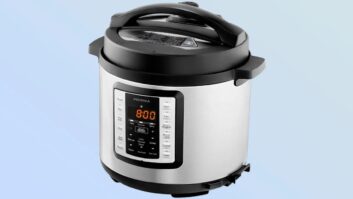CE’s top two CE specialty chains posted powerful revenue growth for the first quarter thanks to store expansions, service enhancements and solid sales gains in core product categories.
Total first quarter sales for Best Buy Co. (ended June 1) grew 24 percent to $4.58 billion, and comparable store sales climbed 5.7 percent, reflecting the addition of 63 Best Buy units and the inclusion of Future Shop’s revenue.
Broken out by chain, sales at Best Buy stores grew 18 percent during the quarter to $3.88 billion, while same store sales climbed 6.6 percent. The solid comps, which exceeded company expectations of 3 percent to 4 percent, were attributed to better-than-expected sales of video game hardware and software, TVs, desktop PCs and computer software. By contrast, the company reported that sales of major appliances “declined modestly.”
Sales were flat for the Musicland store group at $384 million, while same store sales slipped 1.2 percent, which the company said was attributable to ongoing softness in the prerecorded music sector. The weakness was partially offset by gains in video gaming and DVD software, which were among the fastest growing categories companywide, along with DTV and digital cameras.
Comps at Magnolia Hi-Fi fell by the low double digits, while total sales at Future Shop grew 15 percent to $300 million against same store gains of 9.6 percent (in Canadian dollars).
The company expects first quarter earnings to come in at upwards of 21 cents per share and continues to anticipate earnings growth of 18 percent to 21 percent for the full fiscal year.
Meanwhile, Circuit City’s sales for the first quarter ended May 31 grew 13 percent to $2.14 billion, and same store sales soared 12 percent thanks to improved customer service, better in-store merchandise displays, a stronger inventory position and aggressive promotions. Also aiding the results was the company’s poor performance during the prior-year period, when first quarter net was down 13 percent and comps fell 25 percent.
More recently, Circuit City has enhanced its sales counselor training and customer service standards, eliminated its restocking fees, and is emphasizing hassle-free returns and customer receipt tracking in its latest marketing efforts, chairman/CEO Alan McCollough said.
On the product front, the chain saw “especially strong sales” in such areas as DVD software and video gaming, McCollough reported, and enjoyed a resurgence in PC sales thanks to high demand for notebook computers and more competitive pricing. Other strong sellers included big-screen TVs, DVD players, digital satellite systems and wireless communications, he said.
McCollough added that Circuit City has completed remodeling the video departments of the first 20 of some 300 stores slated for retrofits this year, and has upgraded the lighting in more than 100 locations. The video department remodels increase the presence of big-screen and flat-panel TVs, and position them at optimum viewing angles (see TWICE, May 27, p. 14).
Thanks to better-than-expected sales, but tempered by its aggressive promotional stance, the company has reduced its anticipated first quarter loss to between 1 cent and 4 cents per Circuit City Group share.
In other retail sales news:
- Sears said May revenue dipped 1.5 percent to $2.3 billion and comps declined 4.4 percent. Said chairman/ CEO Alan Lacy, “We remain pleased with our profit improvements and inventory position despite the revenue decline.”
- Net sales at Wal-Mart stores grew 13.6 percent to $11.79 billion in May, while comp sales rose 6.8 percent.
- Net sales at Target stores rose 15.2 percent to $2.51 billion in May, while comps grew 4.6 percent.
- Costco’s net sales grew 10 percent to $2.95 billion in May, while comps gained 6 percent domestically.
- Sam’s Club net rose 9.8 percent to $2.45 billion in May, while comps grew 3.7 percent.
- BJ’s Wholesale Club said May sales soared 13.6 percent to $455.1 million and comps gained 3.3 percent, thanks partly to strength in room air conditioners.













